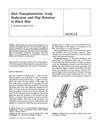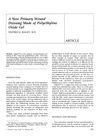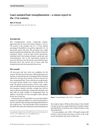11 citations,
January 2018 in “Springer eBooks” The book helps surgeons improve hair transplants for Asian patients.
 8 citations,
January 1986 in “The Journal of Dermatologic Surgery and Oncology”
8 citations,
January 1986 in “The Journal of Dermatologic Surgery and Oncology” Hair loss surgeries like grafts, scalp reductions, and flap rotations can be effective for black men with proper technique adjustments.
1 citations,
May 2006 in “Hair transplant forum international” Well-designed clinical trials are needed to improve hair restoration methods.
 March 2021 in “Indian Journal of Dermatology”
March 2021 in “Indian Journal of Dermatology” A man unhappy with his old hair restoration got a new, natural-looking hairline using a combination of follicular unit extraction and punch graft reduction.
 August 2014 in “Annals of Plastic Surgery”
August 2014 in “Annals of Plastic Surgery” The book is a detailed guide on hair restoration, useful for both new and experienced surgeons.
 May 2005 in “Seminars in Plastic Surgery”
May 2005 in “Seminars in Plastic Surgery” The document concludes that using small hair grafts has improved facial and scalp hair restoration.
 20 citations,
January 2014 in “Journal of Cosmetics, Dermatological Sciences and Applications”
20 citations,
January 2014 in “Journal of Cosmetics, Dermatological Sciences and Applications” Using adipose derived stem cells and growth factors in hair transplants may improve healing and hair growth.
 4 citations,
August 2017 in “JAMA Dermatology”
4 citations,
August 2017 in “JAMA Dermatology” Norman Orentreich pioneered hair transplantation, improving techniques over time for more natural results.
 April 2022 in “Research Square (Research Square)”
April 2022 in “Research Square (Research Square)” The conclusion is that treating scalp AVF caused by hair transplantation with endovascular methods like coiling is safe and effective.
July 2022 in “Hair transplant forum international” PRP therapy and hair transplants can cause rare but treatable scalp hematomas.
 12 citations,
January 1978 in “The Laryngoscope”
12 citations,
January 1978 in “The Laryngoscope” Using a scalp flap for hair transplantation gives denser, faster results than older methods, but it's complex and needs careful planning.
 4 citations,
November 2016 in “Hair transplant forum international”
4 citations,
November 2016 in “Hair transplant forum international” Only about 14% of hair follicles can be safely removed in hair transplants without affecting the surrounding area.
 1 citations,
June 2017 in “JAMA Dermatology”
1 citations,
June 2017 in “JAMA Dermatology” The document corrects a name misspelling, acknowledges a pioneer in hair transplantation, and notes a missing conflict of interest disclosure.
 August 2021 in “Al-Azhar International Medical Journal (Print)”
August 2021 in “Al-Azhar International Medical Journal (Print)” Hair transplantation is effective for treating cicatricial alopecia with fewer anesthesia risks, scars, and recovery time.
 July 2017 in “JAMA Dermatology”
July 2017 in “JAMA Dermatology” The document corrects a missing conflict of interest and acknowledges a pioneer in hair transplantation and his other contributions.

Plucked hair follicles grow faster than conventional ones, making them a potentially better option for hair transplants.
 January 1997 in “프로그램북(구 초록집)”
January 1997 in “프로그램북(구 초록집)” Single hair follicle transplantation is best for restoring eyelashes, eyebrows, and pubic hair, with attention to natural hair direction, thickness, and design.
 January 2016 in “International journal of basic and clinical pharmacology”
January 2016 in “International journal of basic and clinical pharmacology” Steroid use can cause a rare eye condition called central serous retinopathy, which can lead to permanent vision damage.
 13 citations,
October 2002 in “Journal of Investigative Dermatology”
13 citations,
October 2002 in “Journal of Investigative Dermatology” The upper half of a human hair follicle can grow a new hair in a mouse, but success is rare.
 90 citations,
July 2008 in “Dermatologic therapy”
90 citations,
July 2008 in “Dermatologic therapy” Lichen planopilaris is a chronic, scarring hair loss condition with no definitive cure, requiring accurate diagnosis and treatment to manage symptoms.
 67 citations,
February 1983 in “The Journal of Dermatologic Surgery and Oncology”
67 citations,
February 1983 in “The Journal of Dermatologic Surgery and Oncology” Vigilon, a new wound dressing, promotes faster and better healing with less pain.
24 citations,
August 2020 in “JAMA dermatology” Persistent radiation-induced hair loss is dose-dependent, and treatments like topical minoxidil can be effective.
 21 citations,
September 1979 in “Archives of Otolaryngology-head & Neck Surgery”
21 citations,
September 1979 in “Archives of Otolaryngology-head & Neck Surgery” The Juri flap procedure is effective for hair transplantation but requires careful patient selection and skilled surgeons.
 11 citations,
June 2005 in “Journal of Cosmetic Dermatology”
11 citations,
June 2005 in “Journal of Cosmetic Dermatology” Lasers in hair transplantation show promise but are not yet standard, with current methods causing some side effects and needles still being preferred for creating recipient sites.
 10 citations,
January 2008 in “PubMed”
10 citations,
January 2008 in “PubMed” Hair transplantation is a safe, outpatient procedure for restoring hair in individuals with pattern hair loss or certain types of scarring, requiring a trained physician and team, with ongoing medical treatment recommended.
 7 citations,
June 1992 in “The Journal of Dermatologic Surgery and Oncology”
7 citations,
June 1992 in “The Journal of Dermatologic Surgery and Oncology” Hair transplantation is a viable treatment for some types of female hair loss, with careful donor assessment and attention to psychological factors.
 6 citations,
July 2017 in “Clinics in Plastic Surgery”
6 citations,
July 2017 in “Clinics in Plastic Surgery” The document concludes that individualized reconstruction plans are essential for improving function and appearance after head and neck burns.
 June 2003 in “Obstetrical & Gynecological Survey”
June 2003 in “Obstetrical & Gynecological Survey” Hair loss in women can be treated with hormone therapy.

Dense-packing hair grafting is a simple, safe, and effective way to restore hair in people with cicatricial alopecia.
 April 1981 in “Postgraduate Medicine”
April 1981 in “Postgraduate Medicine” In 1981, the punch graft technique was the main method for hair transplantation, and medical treatments for baldness were not very effective.

























